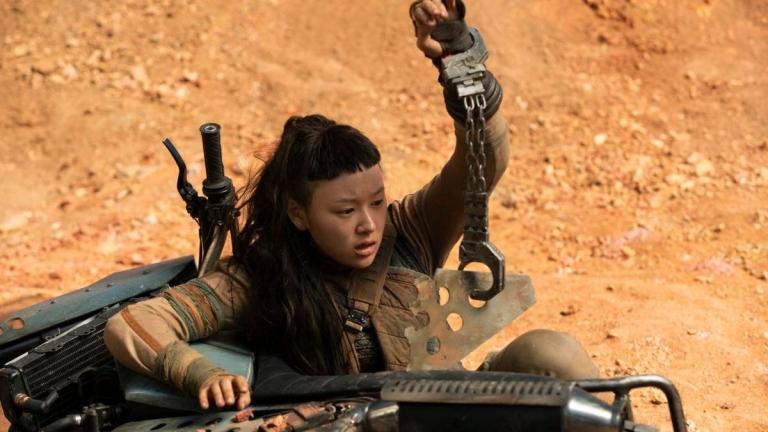Halo Episode 7 Review: Inheritance
A disjointed episode carries the story far from its Halo roots.

This HALO review contains spoilers.
Halo Episode 7
Would Halo be a good science fiction show if it wasn’t called Halo? I found myself asking this a lot while watching “Inheritance.” Is it a sign that a franchise installment has failed if one has to ask? In an episode almost entirely devoid of Master Chief, even the writers’ attention seems to drift.
Kwan is on her way to meet the desert mystics, and reminiscing about her conflict with her father and the Insurrectionists. Her younger self espouses a philosophy that comes across as both nihilistic and radical, wanting to change the world but doubtful it can be done. Also maybe she has the ability to light fires with her mind? She finds the desert mystics in an all-women tent city, and undergoes a sort of vision quest. She’s trapped in a vision of fruitlessly fighting Chief until she asks “why,” at which point she meets the spirits of her ancestors. They tell her Madrigal is the site of a portal and its chosen protectors.
At the same time, Soren is living it up as a space pirate. He has a rival, Squirrel, whose aspirations far outstretch his actual role in the Rubble. When Squirrel tips Soren off to a lightly-guarded UNSC ship carrying valuable slipspace drive components, Soren takes the offer. The space piracy goes well, but better for Soren than for Squirrel. Soren crushes Squirrel’s foot with some heavy machinery to slap him down for trying to climb the ladder.
When Vinsher doubles his efforts to kill Kwan, Soren’s loyalty to Chief reluctantly kicks in. He returns to Madrigal to help Kwan just as she’s returning to the Insurrectionist home base from the first episode. The portal, it turns out, might have been there all along. Kwan and Soren confront Vinsher’s men in the most Halo scene of the whole episode. It’s a video game world, after all: someone has to detonate some explosives manually. Soren and Kwan win the day by the skin of their teeth and part ways with a newfound friendship forged by combat.
One of the strangest things about this script is that, seven episodes in, Kwan and Soren’s entire story still feels like both a prequel and a completed arc. The soaring, fun music at the end of the episode invited an emotional closure and optimism the story did not in fact convey. Kwan has been broken down and built up again, but into what? There’s more flavor from Dune or Mad Max than from Halo here, and she’s been distracted for so long that her bigger-picture plans to take down the UNSC are easily forgotten.
Kwan’s vision quest to see her family tree was striking, although also visually similar enough to Avatar: The Last Airbender to be jarring. However, the idea that she didn’t have a good relationship with her father or never got closure for her political beliefs in the first place, as established by the flashback, seems alternately cliche and irrelevant. I did like the slight twist on the classic “What will you do after the war?” conversation, where Kwan insists the world afterward has to be materially different in order for the Insurrection to have mattered. But whether that was a sign of her convictions, her imagination, or something else was left as a matter of fan conjecture the arc doesn’t earn.
Likewise, Soren’s potential keeps getting diluted. The actual space piracy on screen gave me hope for some action, but ended up brief and personal instead of grand in scope. Soren’s attitude toward Kwan is clearly torn; he himself deliberates over whether to just take the money she offers him and run or to stay and fight. The conflict with Squirrel doesn’t add anything to what we already knew about his role as pirate king, though. As a rival, Squirrel seems pretty pathetic.
The final fight shows off some of Halo‘s iconic weapons, but it’s also a reused setting. Kwan using Master Chief’s discarded gun doesn’t have any emotional weight for her: she doesn’t seem to have changed how she feels about Spartans at all, and was given no reason to do so. The rest of the episode was too slow to make for an exciting lead-up to a battle, which is itself directed with competent, workmanlike disinterest.
As the villain, Burn Gorman makes an earnest attempt at embracing Vinsher’s poetic dialogue. I’d still like a lot more about how he connects to the wider story, too. We know he’s a violent murderer, and we know he’s a UNSC plant, but the show doesn’t seem interested in telling us about how he feels about the UNSC, or where he draws his moral lines. Sometimes, a show like this can afford to be a bit less subtle.
At the beginning of the series, I was excited for Kwan and Soren to make some pointed statements about the crimes of the UNSC. Instead, the show isn’t really saying anything about the wider world of Halo. It doesn’t answer or ask any interesting world-building questions, except perhaps in the weakest sense of the Forerunners possibly having something to do with the Madrigal drug and the portal’s powers. Kwan and Soren’s story feels completely separate from Chief’s, even with his appearance in the vision. Maybe Soren and Kwan’s very existence on the fringe is a sign that the hyper-military structure doesn’t actually help the common folk, but it’s a halfhearted lesson. Bring back the Grunts.
